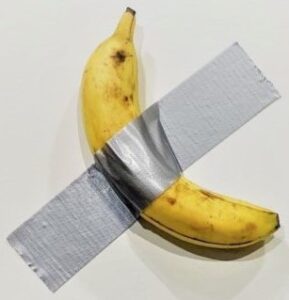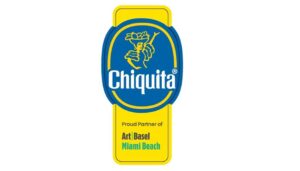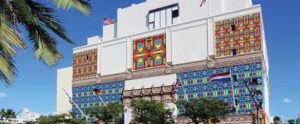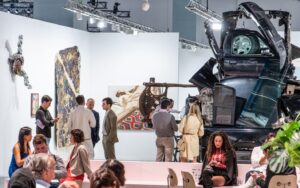 In November of 2024 a banana duct-taped to a white plaster wall sold for $6.2 million at Sotheby’s Contemporary Art Auction. Conceived as an edition (series) of five, titled Comedian, the artist Maurizio Cattelan instructed buyers to change the banana and duct tape when the banana gets brownish. Or, conversely, to replace the banana if eaten, as quickly as possible. And three of such banana installations, living pieces of fruit/banana sculptures, HAVE been eaten, including the $6.2 million banana, by the buyer himself, shortly after the hammer came down at Sotheby’s. It sold to a Chinese crypto currency entrepreneur. A Korean student peeled and ate one of the series of banana fruit sculptures, still taped to the wall, at a museum.
In November of 2024 a banana duct-taped to a white plaster wall sold for $6.2 million at Sotheby’s Contemporary Art Auction. Conceived as an edition (series) of five, titled Comedian, the artist Maurizio Cattelan instructed buyers to change the banana and duct tape when the banana gets brownish. Or, conversely, to replace the banana if eaten, as quickly as possible. And three of such banana installations, living pieces of fruit/banana sculptures, HAVE been eaten, including the $6.2 million banana, by the buyer himself, shortly after the hammer came down at Sotheby’s. It sold to a Chinese crypto currency entrepreneur. A Korean student peeled and ate one of the series of banana fruit sculptures, still taped to the wall, at a museum.
Art Basel Miami
 As always, in the dollar-hungry art world, marketing moguls at Chiquita Banana conjectured that the most fashionable and famous art show in the world, Art Basel Miami Beach, should capitalize on the uproar endangered by the sale of a $6.2 million living/piece of fruit/banana installation. Chiquita’s cute yellow and blue pair of banana carts, offering free bananas, swag, and photo ops, promised something “fun,” when half the world suffers from malnutrition, caused a critical uproar in the press. The banana shaped/themed prizes, such as a 1970s style bright yellow and blue logoed gym bag, however, won over 80,000 attendees. Banana food samples added to the ‘fun.’ Soon long lines formed for the Chiquita blue and yellow street-vendor bike-style banana stations. Labels on each of the free bananas combine the coiffed fruit-bowl hatted, Carmen-Miranda-style, logo-lady with the copy “Chiquita! Proud Partner to Art Basel Miami Beach.”
As always, in the dollar-hungry art world, marketing moguls at Chiquita Banana conjectured that the most fashionable and famous art show in the world, Art Basel Miami Beach, should capitalize on the uproar endangered by the sale of a $6.2 million living/piece of fruit/banana installation. Chiquita’s cute yellow and blue pair of banana carts, offering free bananas, swag, and photo ops, promised something “fun,” when half the world suffers from malnutrition, caused a critical uproar in the press. The banana shaped/themed prizes, such as a 1970s style bright yellow and blue logoed gym bag, however, won over 80,000 attendees. Banana food samples added to the ‘fun.’ Soon long lines formed for the Chiquita blue and yellow street-vendor bike-style banana stations. Labels on each of the free bananas combine the coiffed fruit-bowl hatted, Carmen-Miranda-style, logo-lady with the copy “Chiquita! Proud Partner to Art Basel Miami Beach.”
Founded in 1970 by gallerists from Art Basel Switzerland, Art Basel Miami is the world’s premier contemporary art fair. I first attended in 2005 and saw the glitterati artists, gallerists, and fashionista celebrities in fabulous outfits. All became more ostentatious when I returned in 2017. Not only does each international design corporation and financial institution have a wine, chocolate, or coffee booth manned by super-good-looking types in Gucci, but the event takes over the entire city of Miami.
 For example, at Florida International University, the Wolfsonian Museum restored the scandalous 1928 stained glass window, created by iconic Irish artist Harry Clark (1891-1931). Called the Geneva Window, it was commissioned to celebrate the newly formed Independent Irish Free State as a gift to the League of Nations in Geneva Switzerland. When unveiled in Ireland, the Irish government, highly nationalistic and Catholic at the time, turned it down. The likenesses of celebrated Irish literary figures portrayed characters who were drunk, sexualized, naked, and Protestant. Many writers in Ireland at the time weren’t Catholic.
For example, at Florida International University, the Wolfsonian Museum restored the scandalous 1928 stained glass window, created by iconic Irish artist Harry Clark (1891-1931). Called the Geneva Window, it was commissioned to celebrate the newly formed Independent Irish Free State as a gift to the League of Nations in Geneva Switzerland. When unveiled in Ireland, the Irish government, highly nationalistic and Catholic at the time, turned it down. The likenesses of celebrated Irish literary figures portrayed characters who were drunk, sexualized, naked, and Protestant. Many writers in Ireland at the time weren’t Catholic.
Not the First Time
 Art Basel witnessed the “Banana Connection” with historical branches in Art Basel Miami’s past. In 2019 the artist Cattelan’s first living banana and duct tape installation sold for $120,000 at the fair. Surprised they got so much for a piece of fruit, the gallery increased the price for the second “edition,” another duct taped banana, to $150,000, which sold within hours—purchased for the Guggenheim Museum. The gallery sent a rep to the streets of Miami to buy the first banana available: for $.25 from Alum, a Bangladeshi immigrant street vendor. The inequities of this situation could not have been more poignant, that is, until the final installation of Comedian sold for $6.2 million last month.
Art Basel witnessed the “Banana Connection” with historical branches in Art Basel Miami’s past. In 2019 the artist Cattelan’s first living banana and duct tape installation sold for $120,000 at the fair. Surprised they got so much for a piece of fruit, the gallery increased the price for the second “edition,” another duct taped banana, to $150,000, which sold within hours—purchased for the Guggenheim Museum. The gallery sent a rep to the streets of Miami to buy the first banana available: for $.25 from Alum, a Bangladeshi immigrant street vendor. The inequities of this situation could not have been more poignant, that is, until the final installation of Comedian sold for $6.2 million last month.
Not only is Cattelan’s banana installation reaching a landmark $6.2 for a conceptual installation highly controversial; it shows the decadent egocentric dealings of an elitist art world, assigning random values to whatever. It seems the Chiquita corporation also partook of similar elitist colonization. In June, a Florida court ordered the company to pay $38 million to the victims of a marauding Colombian paramilitary group sponsored in part by Chiquita, the United Self Defense Forces. Most of their fruit is harvested in Columbia.
This week in Miami the fun continues with Design Miami, which also promises to take over the town with shows such as, Disco and Design, sponsored by Future Perfect at the Standard Hotel and Spa. If you visit Miami, stop by and see how disco influenced the design world beyond the mirrored disco ball. The 1970s are baaaack….